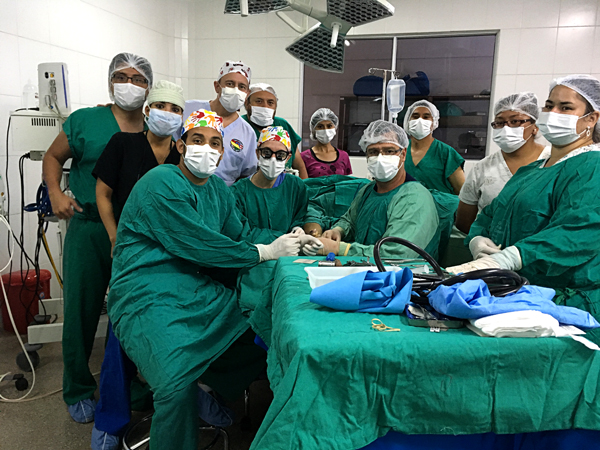
Hand Fellowship

Hand Fellowship
Our Beginnings
Founded in 1990 by internationally renowned surgeon Graham D. Lister, MD, the primary goal of the ACGME Accredited Hand Fellowship at the University of Utah is a commitment to train and educate the best future practitioners and leaders in the field of hand and upper extremity surgery.
Faculty Support
Seven full-time hand surgeons form the faculty and provide a diverse and focused experience for each fellow. Graduates from this program will be exposed to a comprehensive program that includes both a wide variety of upper extremity pathologies and cutting-edge techniques for treatment of disorders of the hand, wrist and elbow. Past fellows have gone on to excel in both academic and private arenas.
Training
The educational goals of the program are to provide world-class training for two Orthopaedic fellows annually that includes elective adult hand procedures, congenital and pediatric hand surgery, as well as microsurgery and major upper extremity trauma. Overall, the University of Utah Hand Fellowship offers a broad and well-balanced curriculum that has an established tradition of preparing our graduates for long and successful careers in upper extremity surgery.
Information
Fellowship positions: Two
Duration: One year, August 1–July 31
Director: Angela Wang, MD
Surgical procedures performed by the faculty in the hand section include cases from fingertips to the mid-shaft humerus, brachial plexus and soft tissue coverage for the entire body, with a balanced caseload of over 1500 cases per year per fellow.
The on-call hand team includes residents as the first call and fellows as backup with an attending. Fellow call is one day per week and one weekend per month. The fellow has attending status and can do routine cases independently, with hand faculty always available as needed.
Specialized Training
Under the direction of seven full-time hand surgeons, you will receive training in the following:
Upper extremity - Hand, elbow, congenital and microvascular.
Level I Trauma Center:
- AirMed
- Catchment area from five surrounding states
- Case load (over 1,500 procedures per year per fellow)
General:
- Upper extremity reconstruction for degenerative and post-traumatic conditions, including elbow
- Endoscopic carpal tunnel release
- Elbow arthroplasty
- Arthroscopy, wrist and elbow
- Trauma - Acute / sub acute bony, soft tissue and nerve treatment
- Microvascular - Replantation of fingers, hand, arm, nerve repair and free flap reconstruction
- Brachial plexus - Pediatric and adult brachial plexus surgery nerve and tendon transfers for reconstruction
- Pediatric - Pediatric trauma and reconstruction
- Congenital - Rare and common congenital anomalies and cerebral palsy
- Rheumatoid arthritis - reconstruction
- Tetraplegia - reconstruction, tendon and nerve transfer
Hand Therapy Services
Along with clinical training fellows will have experience working with the on-site Hand Therapy Services located at the University of Utah Orthopaedic Center. This state-of-the-art hand therapy clinic provides immediate care for hand patients by Certified Hand Therapists. The on-site location allows for close collaboration between hand surgeons and hand therapists to design a personalized evidence-based therapy plan based on the patient's needs. Along with clinic interactions our therapists provide educational lectures to fellows during their training. Working closely with certified hand therapists is a skill that our program values. Our therapists work to collaborate, provide guidance, and focus on education with our fellows.
Schedule
As an orthopaedic hand fellow you are required to participate in the following:
Weekly Conferences & Lectures
- Monday: upper extremity cadaver course
- Tuesday: case/didactic conference
- Wednesday: Grand Rounds
- Thursday: Journal Club
In addition to weekly conference and lecture attendance, Fellows present four to five lectures per year.
Microvascular Training
- A microvascular training lab is available, and we sponsor attendance at a one-week microvascular training course to be done before fellowship. Resident education is expected.

Volunteer Opportunities
There are also opportunities for international volunteer work. Typical international work locations include Bolivia, Dominican Republic, Costa Rica, Nicaragua, and Nepal.
Research
Academically, each fellow is expected to participate in clinical or bench research and must complete 1 1/2 publishable projects during the year.
An excellent biomechanics lab, a robust clinical outcomes database, and the Utah Population Database support this.
There is adequate time for research.
Locations
The fellows work at the following locations, which are all conveniently located on the University of Utah campus:
- University of Utah Orthopaedic Center (UUOC) – a high-volume primarily outpatient surgery center
- University of Utah Hospital – one of two Level-1 trauma centers in Utah
- Primary Children’s Hospital – the only pediatric hospital in the Intermountain West
- Veteran’s Administration Hospital
- Shriner’s Hospital for Children
- Outside Clinics: South Jordan, Farmington, St George, and Cedar City
Tiffany Schild
Phone: 801-587-5457
Fax: 801-587-5411
Email: Tiffany.schild@hsc.utah.edu
University of Utah Orthopaedic Center
590 Wakara Way
Salt Lake City, UT 84108